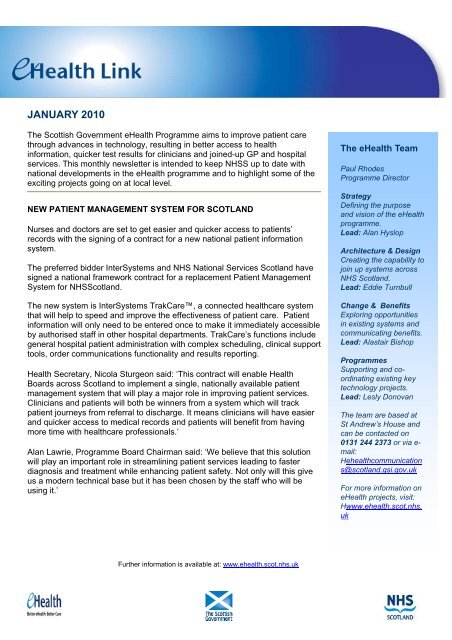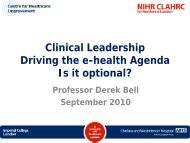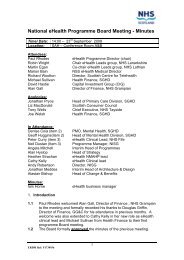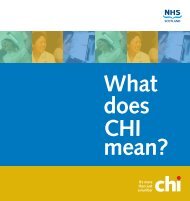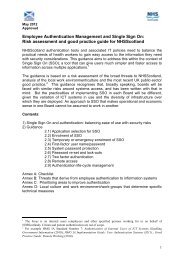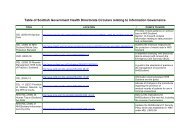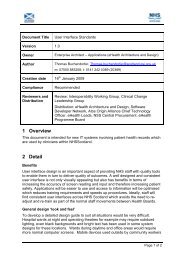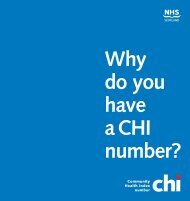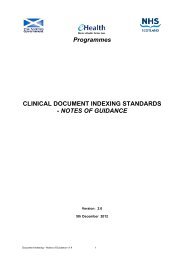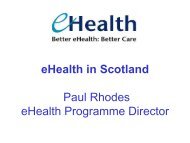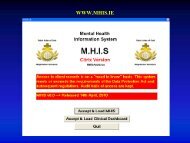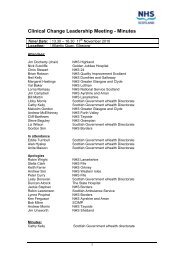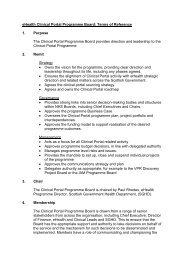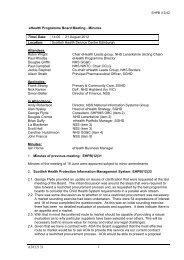JANUARY 2010 - eHealth
JANUARY 2010 - eHealth
JANUARY 2010 - eHealth
Create successful ePaper yourself
Turn your PDF publications into a flip-book with our unique Google optimized e-Paper software.
<strong>JANUARY</strong> <strong>2010</strong>The Scottish Government <strong>eHealth</strong> Programme aims to improve patient carethrough advances in technology, resulting in better access to healthinformation, quicker test results for clinicians and joined-up GP and hospitalservices. This monthly newsletter is intended to keep NHSS up to date withnational developments in the <strong>eHealth</strong> programme and to highlight some of theexciting projects going on at local level.NEW PATIENT MANAGEMENT SYSTEM FOR SCOTLANDNurses and doctors are set to get easier and quicker access to patients’records with the signing of a contract for a new national patient informationsystem.The preferred bidder InterSystems and NHS National Services Scotland havesigned a national framework contract for a replacement Patient ManagementSystem for NHSScotland.The new system is InterSystems TrakCare, a connected healthcare systemthat will help to speed and improve the effectiveness of patient care. Patientinformation will only need to be entered once to make it immediately accessibleby authorised staff in other hospital departments. TrakCare’s functions includegeneral hospital patient administration with complex scheduling, clinical supporttools, order communications functionality and results reporting.Health Secretary, Nicola Sturgeon said: ‘This contract will enable HealthBoards across Scotland to implement a single, nationally available patientmanagement system that will play a major role in improving patient services.Clinicians and patients will both be winners from a system which will trackpatient journeys from referral to discharge. It means clinicians will have easierand quicker access to medical records and patients will benefit from havingmore time with healthcare professionals.’Alan Lawrie, Programme Board Chairman said: ‘We believe that this solutionwill play an important role in streamlining patient services leading to fasterdiagnosis and treatment while enhancing patient safety. Not only will this giveus a modern technical base but it has been chosen by the staff who will beusing it.’The <strong>eHealth</strong> TeamPaul RhodesProgramme DirectorStrategyDefining the purposeand vision of the <strong>eHealth</strong>programme.Lead: Alan HyslopArchitecture & DesignCreating the capability tojoin up systems acrossNHS Scotland.Lead: Eddie TurnbullChange & BenefitsExploring opportunitiesin existing systems andcommunicating benefits.Lead: Alastair BishopProgrammesSupporting and coordinatingexisting keytechnology projects.Lead: Lesly DonovanThe team are based atSt Andrew’s House andcan be contacted on0131 244 2373 or via e-mail:HHehealthcommunications@scotland.gsi.gov.ukFor more information on<strong>eHealth</strong> projects, visit:HHwww.ehealth.scot.nhs.ukFurther information is available at: www.ehealth.scot.nhs.uk
Kerry Stratton, Healthcare Managing Director of InterSystems said: ‘Thedecision to use Health Board staff from many departments in the selectionprocess has given us a clear understanding of NHSScotland’s immediaterequirements and long-term vision. We are now ready to focus on deliveringTrakCare for the benefit of patients and staff in Scotland.’The contract is a national framework in line with the <strong>eHealth</strong> Strategy that willenable any Health Board access to the system and associated modules overthe next four years.Initially the five Consortium NHS Boards involved (Ayrshire & Arran, Borders,Grampian, Greater Glasgow and Clyde, and Lanarkshire) will place contracts tothe value of £44M. These Boards, together with NHS Lothian who already havethis system, care for 70% of the Scottish population. Additional Health Boardsare already in discussion about how this national framework can benefit them.NHS National Services Scotland supported the Consortium by providingprocurement services.For further information contact Mark Stewart at markjstewart@deloitte.co.ukKEY eHEALTH ADVISORY GROUPS POINT THE WAY AHEAD FORCLINICAL PORTALA joint meeting between two key <strong>eHealth</strong> Programme Groups – the <strong>eHealth</strong>Leads and the Clinical Change and Leadership Group - held useful discussionson the continuing development of the Clinical Portal programme at theBeardmore hotel on 20 January. Both groups are keen to encourage a sharedapproach to portal development among Health Boards that will deliver asolution effective across NHS Scotland.Health Boards recognised the value of working in regional groups to deliverClinical Portal and agreed there would be value in further collaboration toexplore regional models. The joint meeting included three break-out sessionsconstructed around the regional theme of North, South and West, with eachgroup discussing key questions around progressing delivery of the majorcomponents of the portal architecture.The South region expressed an appetite to lead procurement activity to deliverthe portal presentation layer. The West region is planning to consider theimpact and alignment of PMS with Clinical Portal. Similarly, the North regionwould like to explore the outcomes of the GPIT procurement and how thistechnology would align with Clinical Portal.All NHS Boards strongly supported the use of a common integration tool tosend information from one computer system to another. There was alsoagreement that boards who are not currently taking forward the national PMSsolution should be allowed to proceed with Clinical Portal development as soonas possible.Further information is available at: www.ehealth.scot.nhs.uk
These recommendations will be discussed further when the Clinical PortalProgramme Board next meets on 8 March.Some changes to Chairs of CCLG and <strong>eHealth</strong> LeadsOn other matters relating to the two groups, the CCLG agreed that Dr JimCampbell from NHS A&A and Dr Gordon Sim from NHS Borders will alternateas co-chair of the CCLG alongside incumbent co-chair Dr Jim Docherty. Thismeans the group will have co-chairs who represent both Primary andSecondary care and both will also alternatively sit on the <strong>eHealth</strong> ProgrammeBoard.On the <strong>eHealth</strong> Leads Group, Jacqui Stephen from NHS Borders will co-chairthe group with Robin Wright. Jacqui will also join the <strong>eHealth</strong> ProgrammeBoard.eHEALTH HELPING THE ARMED FORCESThe <strong>eHealth</strong> Strategy Board has approved recommendations on how <strong>eHealth</strong>can help improve healthcare for the armed forces in Scotland.A scoping project was undertaken by the <strong>eHealth</strong> Strategy Division over 2009which included meetings and workshops with members of the Armed Forces.Findings included:• Need for Armed Forces access to electronic pathology laboratoryresults.• Creating CHI numbers for all non Scottish Armed Forces personnelbased in Scotland.• Proactively helping those leaving the Armed Forces to register with aScottish NHS GP.• Flagging of veteran status on NHS IT national systems.To address these issues a detailed action plan will be developed to implementthe following recommendations:• Provide all serving Armed Forces personnel currently based in Scotlandwith a CHI number.• The Defence Medical Service Primary Care Medical Centres to includethe CHI number in all communications with NHS Scotland.• Universal provision of CHI numbers will in turn enable the DefenceMedical Service Primary Care Medical Centres in Scotland to accessSCI Store for electronic lab results and use the electronic referralprocess.• Make changes to the MODs current pre-retirement processes to assistin finding a GP Practice within the area that personnel leaving thearmed forces plan to live.• Develop a tick box on SCI Gateway for veteran status and provideadvice to all Scottish health boards about records flagging.Further information is available at: www.ehealth.scot.nhs.uk
Further information on how these recommendations are progressing willappear in future editions of this newsletter.For further information contact Karen O’Hanlon at 0131 244 2653.PRINTING EMERGENCY CARE SUMMARY RECORDSThe Emergency Care Summary (ECS) is currently available to all cliniciansworking in Out Of Hours centres, NHS24, A&E Departments and AcuteReceiving Units who take unscheduled admissions, provided the patient hasgiven their consent. This includes hospital pharmacists who see patients aspart of the unscheduled admissions process.ECS records can be printed on admission and form part of the hospital paperrecord, to reduce errors in transcribing manually and improve medicinesreconciliation.The national Scottish Patient Safety Programme considers ECS to be a criticaltool in improving patient safety in hospitals and has requested wider access toECS for all hospital patients.Read more about this and other ECS developments in the ECS Programme’slatest newsletter available here.TAYSIDE AND LOTHIAN BOTH WINNERS AT eGOVERNMENT NATIONALAWARDSCongratulations to NHS Tayside and NHS Lothian who were both winners atthe eGovernment National Awards, announced on 20 January at the Guildhall,London.NHS Tayside Health informatics Directorate’s Electronic Discharge InformationSystem (EDISON) won in the category of ‘Innovation in strategy on a nationallevel’. NHS Lothian’s TrakHealth Programme Team won in the category of‘Proven team working or partnership activity which has delivered more than thesum of it parts’.Read more here.Further information is available at: www.ehealth.scot.nhs.uk
TELEMEDICINE BENEFITS HIGHLIGHTED DURING SEVERE WEATHERNHS Grampian’s telemedicine facilities demonstrated their value once againduring the recent cold spell by allowing video consultations that helped preventunnecessary patient journeys to Aberdeen Royal Infirmary A&E on potentiallyhazardous roads.Patients who were injured by slipping or falling during the bad weather wereable to be assessed by a consultant from a direct videolink from their localcommunity hospital to the ARI.Dr Fiona Mair from the Emergency Dept (ED), Aberdeen Royal Infirmaryexplains:‘On 5 January fifteen patients who had fallen on ice were consulted by videolinks from their community hospitals Minor Injury Units in Banff, Fraserburgh,Turriff, Peterhead and Huntly. Only three patients had to be transferred to theED at ARI for further treatment.‘We are currently auditing those that did travel to the ED from these same fiveareas during the adverse weather conditions who could have attended theirMIU instead and so far only 8 out of 49 patients needed to travel to the ED.‘Telemedicine is part of the service delivery from NHS Grampian. Since itsintroduction in 2000 and we have seen a five-fold increase in the number ofpatients being assessed by telemedicine. Currently we see approximately 60new patients a week and review a further 60 using video conferencingtechnology. One of its main benefits is the ability to deliver services in remoteareas without the need for patients to travel, and this is particularly welcome insevere weather conditions where travel can be such a hazard.’Mr James Ferguson, Clinical Lead to the Scottish Centre for Telehealth added:“We have seen a marked increase in the volume of telemedicine calls duringthe travel problems resulting from the recent winter weather; however thesepatients could have been treated by telemedicine even if the weather had beennormal. This demonstrates that there is still marked potential to further increasethe number of patients treated this way, increasing cost effective use of scarceresources, saving patient travel and reducing carbon emissions. With this inmind, the SCT is exploring the potential to establish a Scotland-wide minorinjuries telemedicine network.”Read more about the Scottish Centre for Telehealth here.Further information is available at: www.ehealth.scot.nhs.uk
PAPERLITE REAPS REWARDS AT STIRLING ROYAL INFIRMARYMaking better use of technology to provide a more patient focused process canchange your local working practices. NHS Forth Valley’s Paperlite Project isreducing excessive paperwork for staff and provides a quicker, safer lab resultsprocess for patients within Stirling Royal Infirmary’s Women and Children’sUnit.Earlier paper-driven processes relied on paper copies of lab results being sentto test requesters. This sometimes led to delays before test results arrived andposted copies occasionally going missing. Pressures on administrators havingto deal with the paper overload caused a build up of unfiled paper copies. Theinevitable result being that clinicians were not seeing test results as early asthey might have.The project improves on previous paper processes to obtain lab results onlineand reduce the time between lab test requests, their delivery and consequentactions.Mairi Whitfield, Department Manager at the Women and Children’s Unitexplains: ‘One of the key areas identified was to change the process ofinitiating a SCI Store search from one based on a single search for eachindividual patient’s test result to a system which undertakes a search of resultsfor every patient on the ward. By doing this we can check on incoming resultsfor everyone and print out all the results on a single sheet rather than have aseparate paper trail for each individual patient.’Checks on SCI-Store and print-outs are made three times a day by ward staffwith any abnormal test results passed immediately on to clinicians and up-todatetest results available for each ward round.The majority of test results can be accessed within 24 hours via the computer.Previously, when reliant on paper copies, it could take several days betweenthe test request and the availability of the test result.Midwife Practitioner Fiore Everington is enthusiastic about the results. ‘Thesystem is very user friendly. We get results more quickly and in time for wardrounds. We no longer have to reference every individual patient record and canhave everything recorded for the ward in one place.’The new system has also led to a significant reduction in paperwork, less timeconsumingadministration and reduced lab overheads on printing, mailing andposting.Work is ongoing within the Women and Children’s Unit to roll out this process.There is also interest from other services, to share the learning from theWomen and Children’s Unit, and to consider how the process could be adaptedfor local use.For further information about Forth Valley’s Paperlight Project please contactMairi Whitfield at mairi.whitfield@nhs.netFurther information is available at: www.ehealth.scot.nhs.uk
The key <strong>eHealth</strong> development was to provide a search strategy in SCI Store byward or team location. This strategy can be extended to other locations and theForth Valley <strong>eHealth</strong> team continue to support the Paperlite work carried out inStirling Royal Infirmary. The Forth Valley <strong>eHealth</strong> team can offer guidance toother boards looking to move to more electronic ways of working with labresults. If you would like support to review your current processes pleasecontact your local <strong>eHealth</strong> teamFor further information on the <strong>eHealth</strong> Change team go to the <strong>eHealth</strong> websitehere.FREE ONE-DAY EVENT TO SEE eHEALTH IN ACTION – 25 MARCHRCN Scotland and the Scottish Government are holding a free to attend oneday<strong>eHealth</strong> event called <strong>eHealth</strong> in Action on Thursday, 25 March <strong>2010</strong> atVictoria Quay Edinburgh. Nurses are at the forefront of using <strong>eHealth</strong> and theevent is intended for all those working in and managing nursing teams andeducation. It will give you the opportunity to:• see various kinds of technology and other uses of <strong>eHealth</strong> in action.• try out a range of interactive resources.• try new initiatives in a safe and friendly environment.• find out about the RCN <strong>eHealth</strong> contribution to <strong>eHealth</strong>.• find out what RCN resources are available to you.• hear about the Scottish Government’s commitment to using <strong>eHealth</strong> tosupport high quality healthcare in the NHS.• find out how you can contribute to <strong>eHealth</strong>.Go to the RCN’s website here for more details or contact Kathryn Clark at RCNEvents on 020 7647 3585 or email Kathryn.clark@rcn.org.ukEVENTS TO NOTEDate Event Venue Details23-24 Feb Data Migration Think Beardmore Hotel Click hereTank25 March <strong>eHealth</strong> in Action Victoria Quay,LeithClick hereFurther information is available at: www.ehealth.scot.nhs.uk


